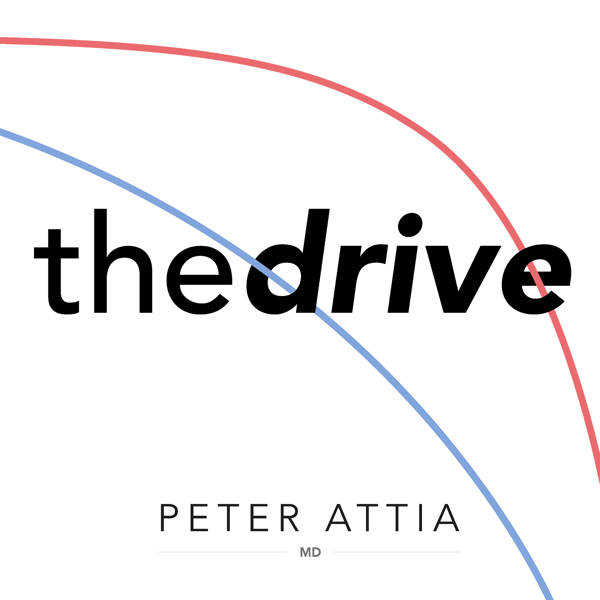#10 - Matt Kaeberlein, Ph.D.: rapamycin and dogs — man’s best friends? — living longer, healthier lives and turning back the clock on aging, and age-related diseases
The Peter Attia Drive
Peter Attia, MD
4.7 • 7.3K Ratings
🗓️ 20 August 2018
⏱️ 93 minutes
🧾️ Download transcript
Summary
Matt is someone who is deeply interested in understanding the biology of aging. Why do we age? What happens to us as we age? What are the things we can do to slow the aging process? How can we delay or prevent the onset of age-related diseases? These are all questions that Matt thinks deeply about, and explores these questions with his research at the University of Washington. He is currently investigating many of these questions through the Dog Aging Project and the compound rapamycin—the only known pharmacological agent to extend lifespan all the way from yeast to mammals—across a billion years of evolution. We talk about cancer, heart disease, Alzheimer’s disease, healthspan, lifespan, and what we can do to provide longer, healthier lives for both people and dogs.
We discuss:
- Matt’s early years and his a-ha moment on aging [4:00];
- Studying dogs [6:30];
- Dogs, rapamycin, and its effects on lifespan and healthspan [15:30];
- An unexpected finding in presumably healthy dogs [36:00];
- Rapamycin in cancer treatment [50:00];
- Why isn’t there a rapamycin trial for Alzheimer’s disease (AD)? [1:01:30];
- If Matt could do a definitive study on life extension in dogs, with resources not being a concern, what does that experiment look like? [1:16:00]; and
- More.
Learn more at www.PeterAttiaMD.com
Transcript
Click on a timestamp to play from that location
| 0:00.0 | Hey everyone, welcome to the Peter Atia Drive. I'm your host, Peter Atia. |
| 0:10.0 | The drive is a result of my hunger for optimizing performance, health, longevity, critical thinking, |
| 0:15.7 | along with a few other obsessions along the way. I've spent the last several years working |
| 0:19.6 | with some of the most successful top performing individuals in the world, and this podcast |
| 0:23.8 | is my attempt to synthesize what I've learned along the way to help you live a higher quality |
| 0:28.3 | and more fulfilling life. If you enjoy this podcast, you can find more information on today's |
| 0:32.5 | episode and other topics at peteratiamd.com. |
| 0:36.3 | In this podcast, I'll be speaking with Matt Cabrillin at the University of Washington. |
| 0:45.9 | I met Matt about a year and a half, maybe two years ago, through David Sabatini, who some |
| 0:50.8 | of you may be familiar with just based on all of his remarkable work around EmTor and |
| 0:55.2 | Rapa Mison. Matt's recognized globally for his research in the biology of aging. He got |
| 1:00.2 | his PhD from MIT in the lab of Lenny Garante, who's produced a number of notable folks in this field. |
| 1:07.2 | He went on to do his post-hoc at the University of Washington, and after completing his post-hoc, |
| 1:11.8 | he has remained there and continues to run a fantastic lab. In this episode, we're going to talk |
| 1:17.3 | about his experience as the director of the dog aging project, which, as its name suggests, |
| 1:22.3 | focuses on the animal model of dogs for its research. Of course, this is really interesting because |
| 1:27.1 | while fruit flies and yeast and mice are interesting, dogs are obviously much closer to us. |
| 1:33.1 | Of course, these dogs, because their pets generally, have something really unique to us that virtually |
| 1:39.4 | no other research animal has, which is they share our environment. This puts them in a pretty unique |
| 1:45.1 | spot that even the Reese's Monkeys studied in the NIA, Wisconsin project, didn't have going for them. |
| 1:52.3 | If you haven't already done so, I'd recommend listening to the podcast that I did with David |
| 1:57.4 | Sabatini because that will get you some of the background on M-Tor and Rapa Mice. I think we |
... |
Please login to see the full transcript.
Disclaimer: The podcast and artwork embedded on this page are from Peter Attia, MD, and are the property of its owner and not affiliated with or endorsed by Tapesearch.
Generated transcripts are the property of Peter Attia, MD and are distributed freely under the Fair Use doctrine. Transcripts generated by Tapesearch are not guaranteed to be accurate.
Copyright © Tapesearch 2025.

